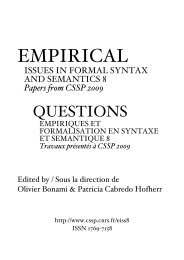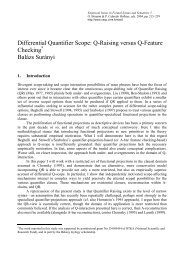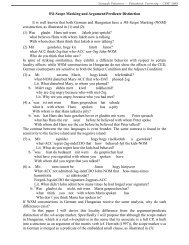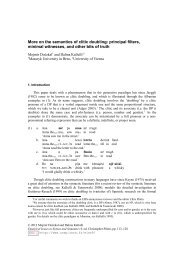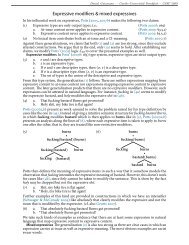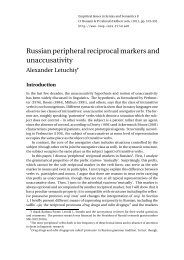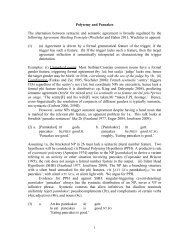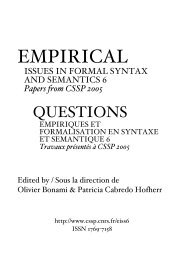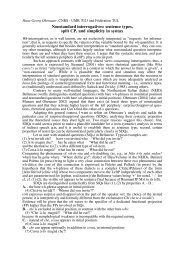Empirical Issues in Syntax and Semantics 9 (EISS 9 ... - CSSP - CNRS
Empirical Issues in Syntax and Semantics 9 (EISS 9 ... - CSSP - CNRS
Empirical Issues in Syntax and Semantics 9 (EISS 9 ... - CSSP - CNRS
Create successful ePaper yourself
Turn your PDF publications into a flip-book with our unique Google optimized e-Paper software.
First, we have some modals: probable (‘probable’), vraisemblable (likely’), il semble (‘it<br />
seems’). While other epistemic modals such as possible (‘possible’), <strong>and</strong> il se peut (‘it may be’)<br />
always require the subjunctive (see class ((v)), the former accept both moods (see Gaatone<br />
2003 for probable).<br />
(34) a. Il est probable que nous essuierons IND encore des pertes en Afghanistan.<br />
(lemonde.fr, 26/08/2006, attributed to B. Kouchner)<br />
It is probable that we will suffer more losses <strong>in</strong> Afghanistan<br />
b. Il est probable que l’une des premières retransmissions télévisées en direct a IND été<br />
réalisée aux Etats-Unis à la f<strong>in</strong> des années 1920 par Ernst Alex<strong>and</strong>erson.<br />
(cahiersdujournalisme.net, C. Jamet, no. 19, 2009)<br />
It is probable that one of the first live TV broadcasts was realized <strong>in</strong> the US at the end<br />
of the 20s by E. Alex<strong>and</strong>erson<br />
c. La m<strong>in</strong>istre de la santé a expliqué qu’il était probable qu’au début de l’automne le<br />
virus soit SUBJ plus actif. (lefigaro.fr, 29/07/2009)<br />
The health m<strong>in</strong>ister expla<strong>in</strong>ed that it was probable that at the beg<strong>in</strong>n<strong>in</strong>g of autumn the<br />
virus would be more active<br />
(35) a. Ils prennent bien so<strong>in</strong> de placer sur le dessus des paniers de grosses pierres. Car les<br />
escargots, s<strong>in</strong>on, s’évaderaient. Il semble que d’un commun effort, s’arc-boutant aux<br />
parois, ils sont IND capables de soulever les couvercles et a<strong>in</strong>si retrouver la liberté.<br />
(J. Roubaud, Nous, les mo<strong>in</strong>s-que-rien, Fils aînés de personne 12 (+ 1)<br />
autobiographies, 2006, p. 179, Frantext)<br />
They are very careful to put big stones on the top of the baskets. Otherwise, the snails<br />
would escape. It seems that, <strong>in</strong> a jo<strong>in</strong>t effort, <strong>and</strong> press<strong>in</strong>g up aga<strong>in</strong>st the sides, they<br />
are able to lift up the cover <strong>and</strong> thus recover their freedom<br />
b. Ils ont rendez-vous avec des notaires et ils visitent des propriétés de toutes sortes […]<br />
Il semble que mon père, pour une raison impérieuse, veuille SUBJ se mettre ‘au vert’.<br />
(P. Modiano, Un pedigree, 2005, p. 63, Frantext)<br />
They make appo<strong>in</strong>tments with lawyers <strong>and</strong> visit all k<strong>in</strong>ds of properties. It seems that<br />
my father, for a press<strong>in</strong>g reason, wants to move to the countryside<br />
c. Pourtant, il me semble que considérer l’enfant malade comme un sa<strong>in</strong>t revient IND à le<br />
nier deux fois. (P. Forest, Tous les enfants sauf un, 2007, p. 61, Frantext)<br />
Nevertheless, it seems to me that to consider a sick child as a sa<strong>in</strong>t amounts to treat<br />
him all the more as a non-entity<br />
A paradigm such as (36) based on acceptability judgments (from Gaatone 2003) <strong>in</strong>dicates<br />
that probable is sensitive to the context. In contrast with possibility, probability <strong>in</strong> itself favors<br />
p rather than non-p. As the <strong>in</strong>terpretation of the ma<strong>in</strong> clause tends towards express<strong>in</strong>g speaker’s<br />
certa<strong>in</strong>ty, the <strong>in</strong>dicative becomes more acceptable. Similarly, while il semble is compatible with<br />
both moods (as regards speaker’s acceptability) (see (35a,b), il me semble clearly favors the<br />
<strong>in</strong>dicative. Here, the explicit realization of the agent, as opposed to an implicit reference with il<br />
semble, gives more importance to the agent’s commitment.<br />
(36) a. Il est probable que le travail {est IND / ?soit SUBJ } déjà achevé.<br />
b. Il est peu probable que le travail {?est IND / soit SUBJ } déjà achevé.<br />
c. Il est improbable que le travail {*est IND / soit SUBJ } déjà achevé.<br />
It is probable / not very probable / improbable that the work is f<strong>in</strong>ished<br />
141



